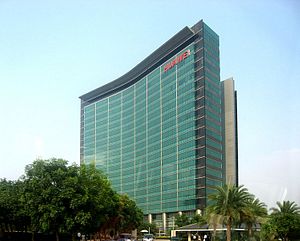Huawei’s problems went from very bad to worse as January wound to a close. The U.S. Justice Department’s release of an indictment outlining the company’s alleged wrongdoing combined with the formal submission to Canada of an extradition request for its chief financial officer, Meng Wanzhou, promise to keep Huawei’s fate high on the U.S.-China agenda.
The indictment outlines the allegations that make up the basis of the United States’ case against the Chinese telecommunications giant. American prosecutors have underlined everything from the company’s practice of conferring bonuses on employees who succeeded in siphoning away privileged information from competitors to lies told by its senior management to U.S. law enforcement about business activities with Iran.
The company is under siege, and the publicized details so far by the United States certainly outline allegations that point to a pattern of persistent rule-breaking. What is interesting is that the U.S. still remains reluctant to introduce into the public record direct evidence of how Huawei equipment might directly aid and abet the PRC’s economic espionage or other efforts to harm American national security.
For the Chinese Communist Party, what should – but won’t – happen as a result of Huawei’s legal troubles in the West is a serious moment of soul-searching about the costs associated with its attempts to marry domestic political authoritarianism with the promotion of indigenous innovation.
Huawei’s global successes are without doubt part of why it has become so emblematic of the PRC’s national hi-tech pride, which is also why Meng’s arrest in Canada has been seen as nothing short of yet another instance of national humiliation. But the company now stands at the vanguard of a broader decoupling between the technology sectors of the West and the rest.
It’s not just the United States or Canada that are problems for Huawei. The European Union has started looking at serious proposals that would mean trouble for it. Concerns in particular about China’s National Intelligence Law have spurred the EU to weigh what may amount to a total de facto ban on Huawei technology within the Union.
Slowly, we’re watching the world of technology cleave between China and the rest. We may not be far off from a world where, as one recent commentary put it, an “iron curtain” separates Western technology companies from their PRC-based counterparts.
In this atmosphere, a recent statement by a Chinese Foreign Ministry spokesperson wishing that the United States might be able to “accommodate other countries’ technological development and progress in an open and inclusive attitude” appears misplaced.
One of the ways out of the current downward trajectory lies at the systemic level and would require what amounts effectively to a transformative miracle in the PRC, with the Party deigning to step back from the operations of Chinese technology companies. This is effectively unthinkable given the public commitments Chinese President Xi Jinping himself has offered under the “Made in China 2025” initiative.
There’s a fundamental mistrust about Chinese industrial policy in the technology sector given the links between Communist Party leadership and the senior executive leadership of even privately owned companies like Huawei. Meng’s possession of a privileged “P” passport underlines these links.
The second way out – the one that may be more appealing to China – would be to chip away at the troublesome consequences of an independent judiciary and the rule of law in the West. Last year, Xi found that U.S. President Donald Trump was able to cut him a favour as ZTE faced dire consequences at the hands of U.S. sanctions enforcement.
Similarly, with a new meeting slated between Trump and Xi to work toward a resolution of the broader trade issues separating the two sides, we might imagine Xi taking up Meng and Huawei’s cases with Trump.
Though Trump should not interfere in the legal proceedings around Meng and Huawei in the United States, he has publicly said that while these issues had not been discussed “yet” during Vice-Premier Liu He’s recent visit to Washington, they “will be” in the future. Trump’s remarks contradict assertions by U.S. Trade Representative Robert Lighthizer that the Huawei issued “has no effect at all” on trade negotiations.
The U.S. trade representative is probably mistaken in this case. It seems unlikely that the United States and China can arrive at a bargain around the basket of trade issues that continue to keep them apart as long as Huawei’s troubles persist. What is likely – and perhaps inevitable – is the start of a broader decoupling between the United States and China on technology. In this sense, Huawei may just be the beginning.
This article first appeared in the South China Morning Post. It is republished here with kind permission.

































